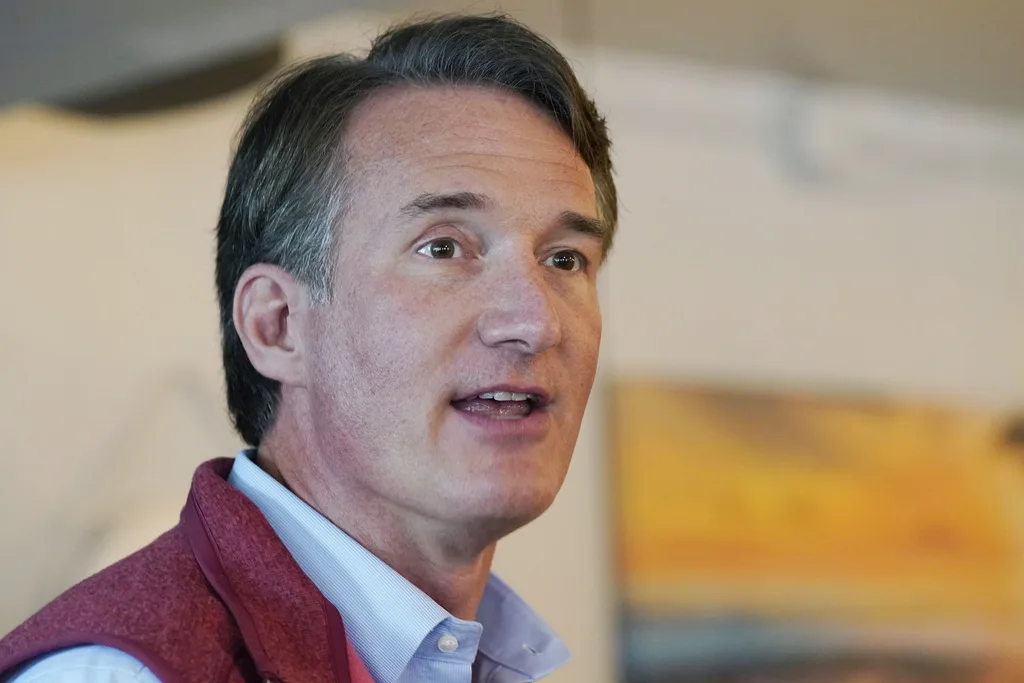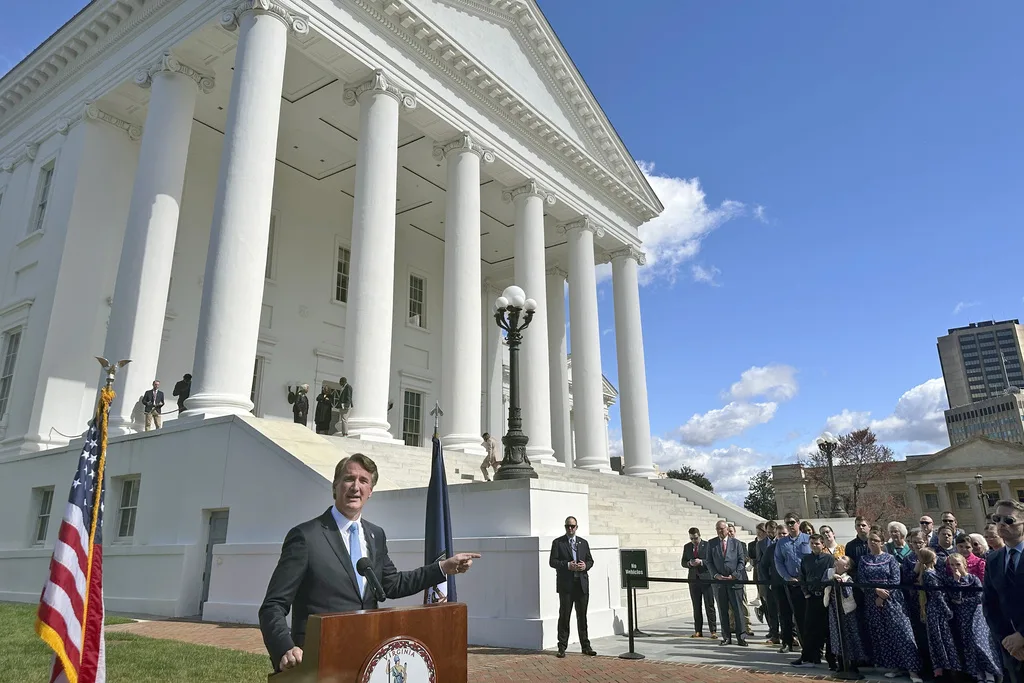
Although Republican Gov. Glenn Youngkin signed a bill meant to enshrine the legality of same-sex marriage, he vetoed or recommended major changes to bills surrounding reproductive and voting rights, gun control, book bans, and more. (AP Photo/Steve Helber, File)
Virginia’s Democratic-controlled General Assembly finished its work on Saturday, allowing the focus to shift to Republican Gov. Glenn Youngkin, who had until Friday night to act upon 84 bills that were sent to him on a shorter-than-usual timeline.
Youngkin signed 64 of the bills, vetoed eight of them, and recommended changes to a dozen.
In a more surprising move, the governor signed off on Senate Bill 101 and House Bill 174 companion bills that seek to enshrine the legality of same-sex marriage in Virginia. Lawmakers introduced these bills in the event that the US Supreme Court reverses its landmark 2015 decision that legalized same-sex marriage nationwide, something LGBTQ advocates and legal experts have warned could happen following the Court’s decision to overturn Roe v. Wade in 2022.
The bills would make it so marriage licenses must be issued to any two people seeking a “lawful marriage,” regardless of gender, race, or sex. The bills would also make it so Virginia recognizes these marriages as valid, but does include a stipulation that gives clergy members and religious organizations the option to not participate in same-sex marriage ceremonies.
The bills are mostly symbolic, as the Virginia Constitution supersedes state law. Democratic lawmakers are still attempting to repeal the constitutional same-sex marriage ban Virginia voters approved in 2006. Enforcement of the ban was blocked in 2015 when the Supreme Court’s ruling in Obergefell v. Hodges legalized same-sex marriage.
In issuing its decision, Youngkin’s office stressed the faith-based exceptions in the bill.
“The bill adds First Amendment protections to the code of Virginia,” Youngkin spokesman Christian Martinez said in a statement. “Religious organizations and members of the clergy acting in their religious capacity now have the authority to decline to officiate marriage ceremonies that violate their conscience. The remainder of the bill deals with the ministerial duties of issuing licenses, which is already guided by federal preemption.”
Youngkin also signed a high-profile bill banning the practice of “legacy admissions” at Virginia’s public colleges and universities. “Legacy admissions” is a shorthand term for the practice of giving preferential treatment to college applicants who are related to alumni or donors.
The ban in the commonwealth was proposed following the US Supreme Court’s decision to end affirmative action at higher education institutions nationwide last year.
Youngkin took a less than favorable stance on gun safety legislation, however.
He vetoed bills that would have kept firearms out of the hands of those credibly accused or convicted of domestic abuse. Senate Bill 47 and House Bill 46 would have required a person already prohibited from owning a firearm due to their conviction or assault of a family member to simply document that they actually relinquished their firearm.
Sen. Barbara Favola (D-Arlington), who introduced Senate Bill 47, said the governor’s veto was a setback for women. She also cited the loophole that many offenders take advantage of when they choose to relinquish their firearms by transferring them to another person. The bills also would have prohibited those gun owners from giving the weapons to someone else in the same household or anyone under 21.
“I am deeply disappointed that given the opportunity to better protect innocent lives, uphold our laws against domestic abusers, and lift up families, this governor has instead turned his back,” Favola said in a statement issued Saturday. “Women deserve better.”
Gov. Youngkin also recommended major changes to House Bill 498, which would require school boards to notify parents and guardians about gun risks and safe storage laws. Youngkin recommended several changes in the bill, recommending a broadening of the notification clause to include a wider variety of parental “rights” and “responsibilities.”
One of these proposed “rights” would be the ability for parents to shield their children from sexually explicit material in their schools, a nod to the broader “parental rights” movement and groups like Moms for Liberty, which have been behind a tsunami of anti-LGBTQ legislation and have tried to ban books from classrooms and school libraries.
According to the nonprofit PEN America, during the 2022-23 academic year, there were 3,362 recorded instances of books banned, an increase of 33% from the 2021-22 school year. Eleven of these book bans happened in Virginia.
The governor has also recommended the bill be reapproved in 2025 before it can go into effect.
Youngkin took a similar stance on reproductive rights legislation—he proposed a religious exemption to Senate Bill 238 and House Bill 819, also known as the Contraceptive Equity Act.
These bills would address critical issues surrounding contraceptive accessibility by eliminating certain copays, cost-sharing requirements, reimbursement requirements, and coverage delays.
The governor’s exemption would “ensure that non-governmental plan sponsors with sincerely held religious or moral beliefs are not required to provide insurance coverage for contraception in accordance with existing federal and state law,” according to his office.
The House of Delegates Democratic Caucus said in a scathing statement issued Saturday that Youngkin’s proposed exemption “only serves the purpose of adding additional barriers to access for women across Virginia who are more than capable of deciding when and how they want to start a family.”
The governor also vetoed House Bill 110, which would have repealed the prohibition on for-profit surrogacy brokers who connect aspiring parents with women willing to carry a pregnancy on their behalf. Proponents of the bill said that the prohibition only serves to create fear surrounding surrogacy by threatening criminal penalties.
Youngkin also vetoed a bill that would have prohibited book banning by local school officials and vetoed another bill that would have clarified that using or posessing marijuana isn’t necessarily evidence of child abuse or neglect. The governor’s veto also suggests a grim future of Senate Bill 448 and House Bill 698, which would allow recreational marijuana sales to begin in the commonwealth next year.
Finally, the governor vetoed a bill that would have forced his administration to reenter the multi-state Electronic Registration Information Center (ERIC), a nonprofit voter roll maintenance program meant to improve the accuracy of America’s voter rolls.
In its statement issued Saturday, the House Democratic Caucus said that Youngkin’s initial actions on these bills show the “true colors of Virginia Republicans” and the “dangerous MAGA agenda.”
“The governor’s choice to veto and offer overzealous amendments to these critical pieces of legislation will do nothing more than ensure that guns are left in the hands of domestic abusers, restrict access to reproductive health care, and threaten our democracy and our voting rights,” their statement reads.
Lawmakers will reconvene on April 17 to consider the governor’s initial amendments and vetoes. Although Democrats have the majority in both chambers, they are short of the two-thirds votes necessary to enact laws despite Youngkin’s opposition, meaning that any overrides of his vetoes are unlikely.
Politics

Biden administration bans noncompete clauses for workers
The Federal Trade Commission (FTC) voted on Tuesday to ban noncompete agreements—those pesky clauses that employers often force their workers to...

Democratic shakeup in Virginia primaries for governor, lieutenant governor
Richmond Mayor Levar Stoney quit his bid for governor and jumped into the race to be the Democratic nominee for lieutenant governor. The race for...
Local News

The zodiac signs of 12 iconic women offer insight into their historic accomplishments
Zodiac signs can tell you a lot about someone’s personality. Whether they’re an earth, water, air, or fire sign, these 12 categories (which are...

Virginia verses: Celebrating 5 poetic icons for National Poetry Month
There’s no shortage of great writers when it comes to our commonwealth. From the haunting verses of Edgar Allan Poe, who found solace in Richmond's...




